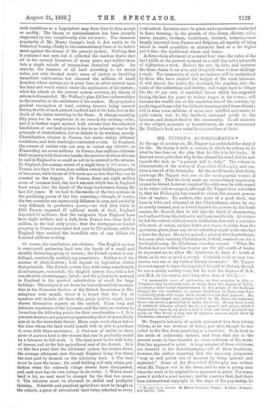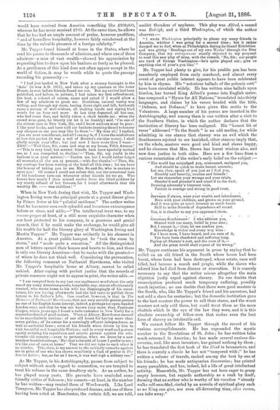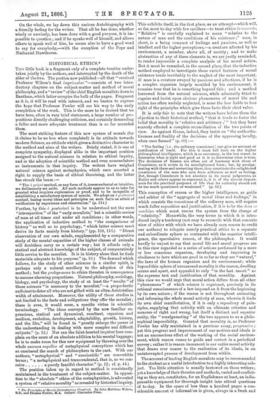MR. TUPPER'S AUTOBLOGRAPHY.•
AT the age of seventy-six, Mr. Tupper has published the story of his life. He begins it with a Emmet, in which he refuses to do what he has done on the plea that his life is in his books. It does not seem quite clear why he has altered his mind, but he now regards the task as "a present call to duty." The volume is characteristic of the author of Proverbial Philosophy, and con- tains a record of his triumphs. All the world knows that thirty years ago Mr. Tupper was one of the most popular writers of the century. That his book made an extraordinary impression cannot be denied, however sceptical the critic may be with regard to its value; but we suspect, although Mr. Tupper does not admit it, that his Philosophy has ceased to charm the present genera-
tion of readers. Its author, who came of a good stock, was born in 1810, and educated at the Charterhouse, where he was so cruelly treated, and so forced beyond his powers by the head- master, Dr. Russell, that he fell into the habit of stammering, and suffered from this infirmity until past middle life. At sixteen he left the school, without much distinction, but with a consider- able stock of verses, neither better nor worse, to judge from the specimens given, than any clever schoolboy might write who had a turn for rhyme. He never gained a prize at the Charterhouse, but soon after entering Christchurch, Oxford, received one for a theological essay, Mr. Gladstone standing second. " When Dr. Burton had me before him to give me the £25 worth of books, he requested me to allow Mr. Gladstone to have £5 worth of them, as he was so good a second. Certainly such an easy con- cession was one of my earliest literary triumphs." Mr. Tupper does not appear to have distinguished himself at Oxford, though he was a steady reading man, but he took his degrees of B.A.
and M.A. in due course, and, long after, that of D.C.L. — "A memorable curio of authorship on that occasion is this :- Whatever may be the rule now, iu those days the degree of D.C.L. involved a three hours' imprisonment in the pulpit of the Bodleian Chapel, for the candidate to answer therefrom in Latin any theo- logical objectors who might show thentse'ves for that purpose. As, however, the chapel was always locked by Dr. Bliss, the registrar, there was never a possibility to make objection. So my three hours of enforced idleness obliged me to use pencil and paper, which I happened to have in my pocket, and I then and there produced my poem on 'The Dead,' a long one of eighteen stanzas, mach liked by Gladstone, amongst others."
Mr. Tupper's infirmity of speech prevented him from taking Orders, as he was desirous of doing, and also, though he was called to the Bar, from practising as a barrister. So be took to the trade of authorship instead, and from that day to the present seems to have hoarded up every criticism of his works that has appeared in print. A large number of these criticisms are inserted in the Autobiography,—all of them laudatory, however, the author observing that the opposing judgments "may as well perish out of memory by being ignored and neglected." Some of the Proverbial Philosophy was written when Mr. Topper was in his teens, and he was a young man when the work in its original form appeared in print. For many years it yielded a good income ; and he observes that, had there been international copyright in the days of his popularity, he • my Life as an Author. By MartIn Farquhar Tupper. Lyndon: Sampson Low and Co. 1686.
would have received from America something like £100,000, whereas he has never received £100. At the same time, he allows that he has had an ample amount of praise, however profitless, " and of boundless hospitality, however fairly reimbursed at the time by the valuable presence of a foreign celebrity."
Mr. Tupper found himself at home in the States, where he read his poems to thousands of admirers, and where one of these admirers—a man of vast wealth—showed his appreciation by requesting him to draw upon his bankers as freely as he pleased. As a gentleman of this kind does not often appear except in the world of fiction, it may be worth while to quote the passage recording his generosity :-
" I had just landed in New York after a stormy fortnight in the 'Asia' (it was A.D. 1851), and taken up my quarters at the Astor House, to rest before friends found me out. But my arrival had been published, and before, in private, I had taken my first refreshment, the host, a colonel of course, came and asked if I would allow a few of my admirers to greet me. Doubtless, natural vanity was willing, and through my room, having doors right and left, forthwith came a stream of well-wishers, all shaking bands and saying kind words for an hour and more. At last they departed, all but one, who had come first, and boldly taken a chair beside me : when the crowd were gone, be bluntly (or let it be frankly) said, 'I'm one of the richest men in New York, Sir, and I know authors must be poor ; I like your books, and have told my bankers (naming them) to honour any cheques on me you may like to draw.'—' My dear sir,' I replied, you are most considerate, and all I can say is, if I have the misfortune to lose this packet (it was a roll of Herries's circular notes), I shall gladly accept your offer ; but just now I have more than I want— £300.'—' Well then, Sir, come and stay at my house, Fifth Avenue.' —' This is very kind, but several friends here have specially invited me, so I am compelled to decline.'—' Then, Sir, my yacht in the harbour is at your service.'—' Pardon me, but I would rather forget all memories of the sea at present,—with due thanks.'—' Then, Sir, my carriage has been waiting at the hotel all this time ; let me have the honour of taking you to see Mrs. So-and-So, who is anxious to meet you.' Of course I could not refuse this, nor the occasional loan of his handsome turn-out whenever other friends let me go. Who knows how nearly I then missed smiles from the blind goddess by my sturdy refusal of her favours, for I heard afterwards that the wealthy Mr. — was childless ! "
When in New York during that visit, Mr. Tupper and Wash- ington Irving were the principal guests at a grand dinner given by Prince Astor at his " palatial residence." The author writes that he has never seen such splendid and luxurious extravagance before or since, and adds,—" The intellectual treat was, to my amour-propre at least, of a still more exquisite character when our host protested to his company, in a generous and genial speech, that if he could make the exchange, he would give all his wealth for half the literary glory of Washington Irving and Martin Tupper." Mr. Tupper was evidently in his element in America. At a great public banquet he "took the room by storm," and " made quite a sensation." All the distinguished men of letters opened their houses and hearts to him, and there is only one literary American—but he ranks with the greatest— of whom he does not think well. Considering the provocation, the following comment on Nathaniel Hawthorne, who visited Mr. Tupper's hospitable home at Albary, cannot be called unkiod. After saying with perfect justice that the records of private converse ought not to appear in print, the writer adds :- " I am tempted here to say just one unpleasant word about the only oneof my many American guests, hospitably, nay, almost affectionately treated, who wrote home to his wife too disparagingly of his enter- tainer, his son having afterwards had the bad taste to publish those letters in his father's Life. One comfort, however, is that in The Memoirs of Nathaniel Hawthorne, that not very amiable genius praises no one of his English hosts (except, indeed, a perhaps too open-handed London one), and that he was not known (any more than Fenimore Cooper, whom years ago I found a rude customer in New York) for a superabundance of good-nature. When at Albury, Hawthorne seemed to us superlatively envious : of our old house for having more than seven gables ; of its owner for a seemingly affluent independence, as well as authorial fame ; even of his friends when driven by him to visit beautiful and hospitable Wottms ; and in every word and gesture openly entering his republican and ascetic protest against the aris- tocratic old country,—even to protesting, when we drove by a new weather-boarded cottage, Ha! that's the sort of house I prefer to see ; it's like one of ours at home.' That we did not take to each other is no wonder. This, then, is my answer to the unkindly remarks against me in print of one who has shown manifestly a flash of genius in The Scarlet Letter ; bat, so far as I know, it was well-nigh a solitary one."
As Mr. Tupper, in his Autobiography, passes from subject to subject without much regard to connection, we are tempted to treat his volume in the same desultory style. As an author, he has played many parts. His proverbs have reminded some friendly critics of Solomon ; his sonnets—at least, in the number he has written—may remind them of Wordsworth. Like Lord Tennyson, Mr. Topper has also produced dramas, and one of them having been acted at Manchester, the curtain fell, we are told, amidst thunders of applause. This play was Alfred, a second was Raleigh, and a third Washington, of which the author
observes :—
" I wrote Washington principally to please my many friends in America, whither I was going for a second time ; but it rather damped me to find, when at Philadelphia daring its Grand Exhibition and was giving Readings out of my own Works' through the Star Company, that my entrepreneur stoutly objected to my proposal to read this new play of mine, with the remark, No, Sir ; our people are tired of George Washington—he's quite played oat ; give us anything else of your's you like.' " Mr. Tupper had plenty to give, for his prolific pen has been ceaselessly employed from early manhood, and almost every event of great public interest appears to have been celebrated
by him in rhyme. His " notorious ballads of the polemic sort" have been circulated widely. He has written nine ballads upon Gordon, has turned King Alfred's poems into English metre, has composed a " Hymn for All Nations," translated into thirty languages, and claims by his verses headed with the title, "Defence, not Defiance," to have given this motto to the Volunteers. A large number of his poems are inserted in the Autobiography, and among them is one written after a visit to the Southern States, in which the author declares that the institution of Slavery has been maligned. His "honest bit of verse" addressed " To the South " is an odd medley, for while admitting in one stanza that slavery was an evil which the Southerners rejoiced to see banished, other stanzas imply that, on the whole, masters were good and kind and slaves happy, and he observes that Mrs. Stowe has learnt wisdom also, and
now does justice to both sides. Here are a few lines from a
curious recantation of the writer's early belief on the subject :—
" The world has misjudged you, mistrusted, maligned you,
And should be quick to make honest amends ;
Let me, then, speak of you just as I find you,
Humbly and heartily, cousins and friends !
Let me remember your wrongs and your trials, Slander'd and plunder'd and crush'd to the dust, Draining adversity's bitterest vials, Patient in courage and strong in good trust.
........ . . . . Servants if slaves, were your wealth and inheritance, Bora with your children, and grown on your ground, And it was quite as much interest as merit hence Still to make friends of dependents all round. Yes, it is slander to say you oppressed them.
Generous Southerners ! I who address you, Shared with too many, belief in your sins ; But I recant it,—thus, let me confess you, Knowledge is victor and every way wins : For I have seen, I have heard, and am sure of it,
You have been slandered and suffering long, Paying all Slavery's cost, and the cure of it,— And the great world shall repent of its wrong."
Mr. Tupper continues his argument in prose by saying that he
called on an old friend in the South whose house had been burnt, whose farm had been destroyed, whose estate, once well tilled, had become a marsh and jungle, while the slaves who adored him had died from disease or starvation. It is scarcely necessary to say that the writer misses altogether the main objebtion justly urged .against slavery. No one doubts that emancipation produced much temporary suffering, possibly much injustice; no one doubts that there were good masters in the South, who, like Mr. Topper's friend and his ancestors, had not sold a slave for centuries ; but the domestic institution gave to the best masters the power to sell their slaves, and the worst masters not only sold them, but could treat them as the mere chattels which in the eye of the law they were, and it is this absolute ownership of fellow-men that makes even the best form of slavery an intolerable evil.
We cannot follow Mr. Tupper through the record of his
various accomplishments. He has expounded the mystic number in the Revelations of St. John ; he has written tales much esteemed in America; he has made several curious dis- coveries, and, like most inventors, has gained nothing by them ; he has translated the first book of the Iliad in hexameters, and there is scarcely a classic he has not "tampered with ;" he has
written a volume of travels, ranked among the best by one of his friends ; he has made antiquarian discoveries ; has printed
many pamphlets, and has, indeed, led a life of great intellectual activity. Meanwhile, Mr. Tupper has not been eager to grasp empty honours, but regards authorship as a rank by itself, deeming that an author who is worthy of his vocation " already walks self-ennobled, circled by an aureola of spiritual glory such - as no King can give, nor even all-devouring time, edax rerum, can take away."
On the whole, we lay down this carious Autobiography with a friendly feeling for the writer. That all he has done, whether wisely or unwisely, has been done with a good purpose, it is im- possible to question ; and if he speaks well of himself, and allows others to speak well of him, he seems also to have a good word to say for everybody,—with the exception of the Pope and Nathaniel Hawthorne.




































 Previous page
Previous page